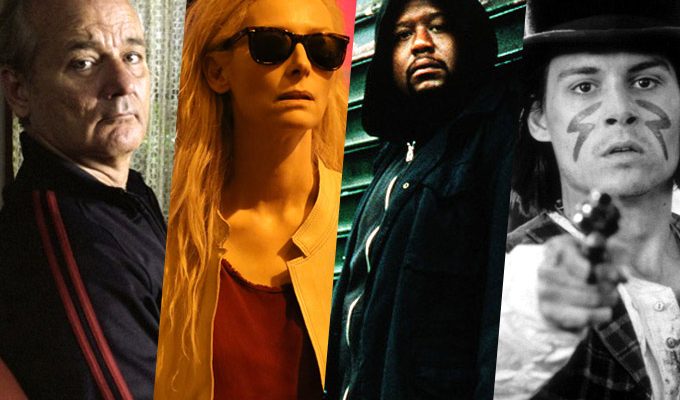
It all seems so obvious in retrospect. Of course, of all the parts Tilda Swinton and Tom Hiddleston were born to play, a pair of lovelorn vampires battling the ennui of immortality in a Jim Jarmusch movie should always have been at the top of the list. “Only Lovers Left Alive,” which opens this weekend (review here), makes good on that logline and then some, delivering Jarmusch’s most deliriously enjoyable film in ages (see our complete retrospective of his films here), and showcasing as ever a cast that turn in terrific performances right down to the smallest supporting performer. But it’s Hiddleston and Swinton who carry the film, and they do so with such louche grace that they make their vampiric lifestyle seem dark and twisted and tortured and yet also so seductive and alluring and downright sexy, that at the potential cost of our eternal souls we’d proffer our own necks to them at the drop of a hat.
In fact, it’s a strange truth that Jarmusch, in being so frequently referred to as an indie pioneer, as a visual stylist and narrative experimentalist, is rarely given enough props for being something arguably much rarer and more precious: an actor’s director. Not that he creates films solely as acting showcases, but more that he has an uncanny knack for choosing actors attuned to his own sensibilities, thereafter unlocking extra levels in their characters as a result. So if the stylishness of his movies, and the definitive auteurist stamp that Jarmusch leaves on them all somewhat belie his talent for eliciting empathetic performances within the tight parameters of his peculiar vision, we thought we’d go about redressing that imbalance a little and use the occasion of the release of “Only Lovers Left Alive” (which is cause for celebration, believe us) as an excuse to take a look back, and choose our ten favorite performances in Jim Jarmusch films to date.
Johnny Depp in “Dead Man”
“You William Blake?” “Yes I am. Do you know my poetry?” With these words, Johnny Depp’s Blake, embraces, for once, the coincidence of his name (Jarmusch does love his nomenclature gags), as well as his destiny to become a legendary killer of white men, promptly shooting his pursuers dead. We’ve written often and long about our love for Jarmusch’s haunting, yet also goofy existential Western, from its Ansel Adams-inspired black and white cinematography, to the ensemble cast that includes Iggy Pop in a dress and Robert Mitchum in his last role, to the sparse, beautifully anachronistic Neil Young score, but it also features one of our very favorite Jarmusch performances, and one that now serves as a timely reminder of what a certain then-exciting, then-young actor could do, before he ran away to be a pirate. Depp, despite his undeniable beauty, always had the ability to project insecurity, even shyness, and it’s this quality that he taps into so effectively in this role, making his transformation from shambling, subservient clerk to murderous outlaw all the more satisfying, yet never letting go of the strain of thoughtful melancholy that pervades the whole film. Blake, a city boy unfamiliar with the rough code of the frontier wilderness journeys for miles, sometimes accompanied by his stoic Native American sidekick Nobody (Gary Farmer, who returns briefly as this character in “Ghost Dog”), sometimes alone, but Depp’s soulfulness never lets us forget that it’s his inner journey that is the greater odyssey culminating in nothing less than an acceptance of his own death, and an acknowledgement of the fundamental absurdity of all the living that’s gone before it. Often Jarmusch films, “Only Lovers Left Alive” included, have a gloss of style and droll wit that evokes this sort of existential ennui; in “Dead Man,” however, he plumbs its depths more than ever before or since, aided by the oceanic, but underplayed depth of feeling and thoughtfulness and weariness that Depp brings to Blake — a man peeping into the abyss, finding the abyss looking back, and coming to the realization that it’s one staring contest he can’t possibly win.
Armin Mueller-Stahl in “Night On Earth”
The agony of compiling this particular list (ok, maybe “agony” is overstating a little) is that Jarmusch is prone to including a feast of quirky, eccentric cameos in his films, small moments that might well make it into the hall of fame for another director, but that we have to overlook here in favor of more comprehensive, meatier roles. And that problem is exacerbated by several of Jarmusch’s releases being antholgies of loosely linked vignettes, such as the charmingly uneven “Coffee and Cigarettes,” “Mystery Train” and also “Night on Earth.” This latter contains a host of terrific performances, from Roberto Benigni’s Italian cab driver, to the three drunken Finnish guys being told the saddest story they’ve ever heard, but we’re going to call out the New York section especially, in which all three actors (Giancarlo Esposito, Rosie Perez and Armin Mueller-Stahl) are strong, but it’s Mueller-Stahl who breaks your heart. Playing an East German ex-circus clown who lets his passenger drive because he’s not familiar with the car’s transmission, the actor creates one of the sweetest characters Jarmusch has ever written, riffing on his lack of English as a conduit to some humorous exchanges, as in “Down by Law,” but mostly letting the character’s bearlike, big-hearted naivete shine through, especially when contrasted with the fast-talking manic energy of Esposito and Perez,. Mueller-Stahl was Oscar-nominated for “Shine” but with terrific supporting turns in “Music Box,” “Kafka” and more recently “Eastern Promises” to his name, the Wadja and Fassbinder regular should be more well known. For anyone interested in looking into his filmography, we recommend the New York segment of “Night on Earth” as an entry point–it’s a beautifully unpatronizing portrait of the immigrant experience, and a very funny take on how strangely hopeful a place a New York City taxicab can be. As well as just a tiny bit terrifying.

